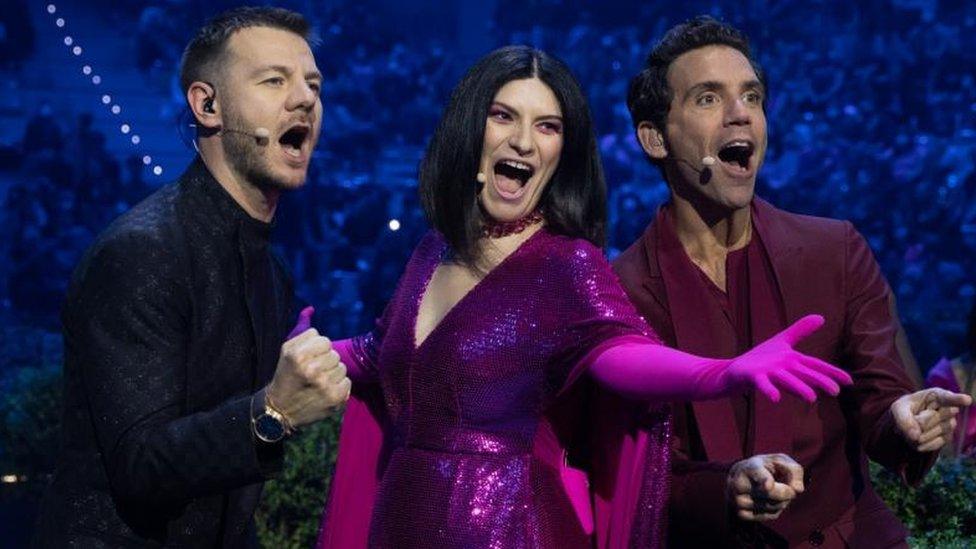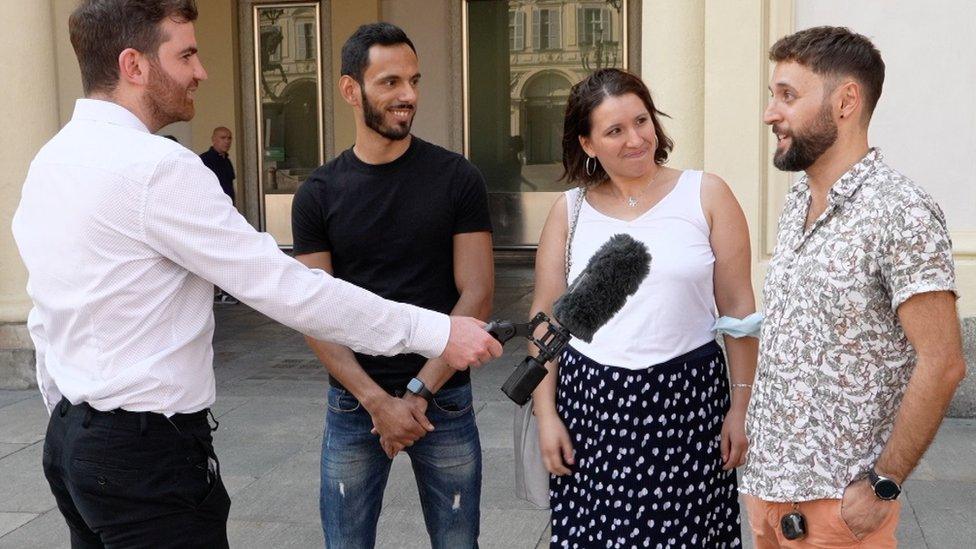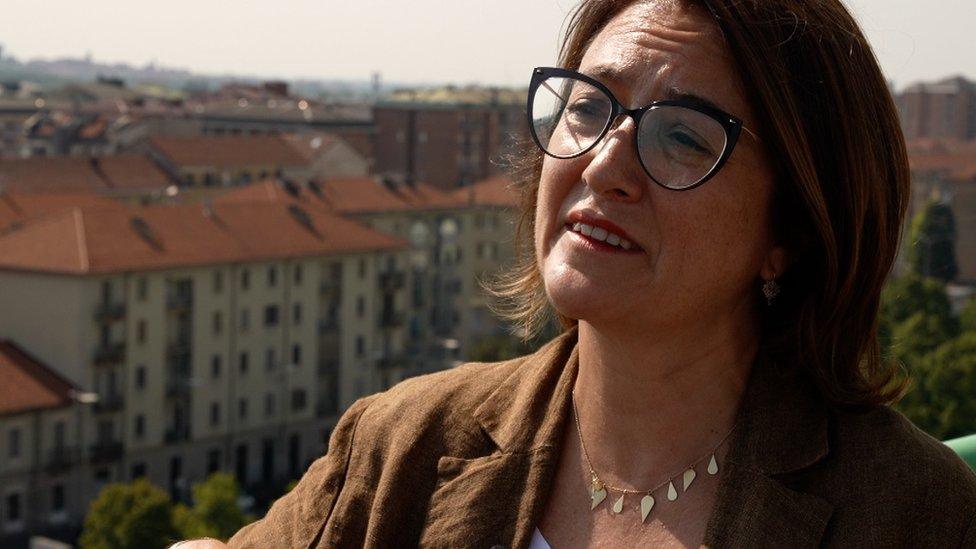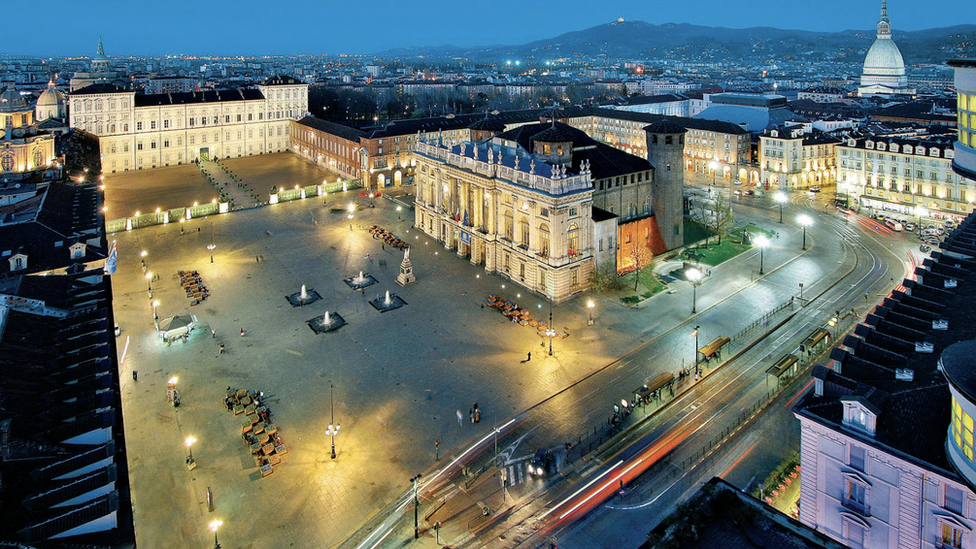Eurovision UK host city: Turin's advice to song-contest organisers
- Published

Alessandro Cattelan, Laura Pausini and Mika hosted of this year's Eurovision Song Contest
Mohamad El Zein still talks about how "colourful and diverse" Turin was in May.
One of 650 Eurovision Song Contest volunteers in the Italian industrial city - with numerous events for locals and tourists outside of the arena - the 29-year-old says: "From 06:00 to 03:00 it was venue, party, venue, party."
To be in their city with the most watched live music event "going worldwide" was "an incredible experience", his friend Giovanni Caponetto agrees, beaming with pride tens of thousands had visited for the first time for one his favourite events of the year.
"It was like the whole world was in Turin," the 38-year-old says.
"It's the most unique competition. It's not about winning, it's about having the most fun."

Mohamad, Sara and Giovanni welcomed thousands of visitors to Turin
The competition, the first in Italy since 1991, "was a success well beyond our expectation", Turin's Deputy Mayor, Michela Favaro, tells BBC News.
The city spent £10m - but, with nearly half of hotel bookings made by foreign tourists, "what you get back from the investment is much higher".
It would have been hard to justify, however, city officials tell BBC News, had the cost-of-living crisis hit earlier.
"It was a positive event," La Stampa's Fabrizio Goria agrees.
The hospitality sector made "seven times" what the city spent, with "nine out of 10 saying they'll come back for a second visit".
"But with the war in Ukraine and inflation hitting the global economy," he adds, "it would be harder to host a Eurovision Song Contest again."
Earlier this week, British households were warned energy bills could hit £4,266 next year.
Manchester, Liverpool, Glasgow, Leeds and Birmingham are among the UK cities to have applied to host in 2023
The BBC announces the shortlist on Friday.
The UK won the jury vote - but huge public support gave Ukraine the lead
The winning country normally hosts the following year - but organisers ruled staging it in Ukraine would be unsafe.
And the BBC accepted the invitation, after the UK's Sam Ryder came second.
It will cost between £8m and £16m - but "there are a number of funding options to be explored to ensure it's value for licence-fee payers".

Eurovision 2022
About 2,300 people worked on the construction and production
Nearly 12,000 applied for the 650 volunteer roles
Tourism rose 68% compared with the same period in 2019
The Eurovision village was visited 220,000 times
The 161 million viewers was fewer than previous years, after organisers disqualified Russia and data could not be collected from Ukraine

Ms Favaro says it was important for her "to involve the residents" in the months leading up to the contest.
She advises the UK winning city to do the same because it "will be an important milestone in the city's history".

On the rooftop of the Lingotto building - now an arts and culture centre but formerly a factory making Turin's best known export, Fiat cars - a laughing Ms Favaro tells BBC News she was not a Eurovision fan before Italy won in 2021.
But she is now a "strong supporter", which goes down well with Turin resident Sara Coppola, who lives and breathes the contest.
The 30-year-old has written a book on her love of Eurovision and was thrilled to be able to go to it for the first time.
"It was magical," she tells BBC News.
"Just to walk around the city and find a Eurovision artist out of the blue was cool."

Italy's former capital had failed, in recent years, to attract the visitor numbers of Milan, Florence and Genoa
It will have been 25 years since the UK last threw Europe's biggest party - in Birmingham - and the event has a changed a lot.
Now, a 10,000-capacity arena is required for the huge production - and enough hotel rooms for the crew, fans and journalists.
There will also be fan parks, with bars and clubs hosting Eurovision parties around the two semi-finals and grand final.
"Prepare your hotels, your restaurants, your pubs," this year's host, Alessandro Cattelan, tells BBC News.
"It's going to be a great week for your city.
"Be kind to the people who'll come - they'll have everlasting good memories of your city."